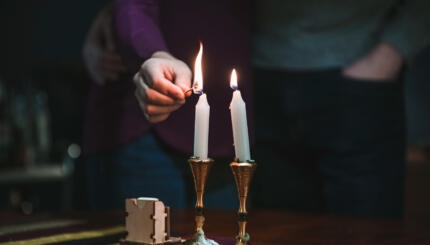During the High Holiday period, we expect a great deal from ourselves. Putting aside the business of material holiday preparation (meals! more meals! house cleaning for guests!) we also understand this period to be one in which we are expected to review our year, figure out what we have done wrong and try to right it. Although we all understand that the Jewish tradition allows to to do teshuvah, to repent and repair our relationships with one another and God at any time, from Elul through Hoshanah Rabbah with its seesawing from joy to awe to fear and back again is intended to prompt us to take stock, now and particularly at the apex of the season, during the aseret yamei hateshuvah – the ten days of repentance from Rosh Hashanah to Yom Kippur.
But actually accomplishing such a thing seems impossible. And truthfully, how many of us achieve it? Or… what is it, even, that we are expected to achieve in just a few short weeks?
Rabbi Soloveitchik tells a personal story1:
On the seventh day of Pesach (Passover), 5727 [1967]. awoke from a fitful sleep. A thunderstorm was raging outside and the wind and rain blew angrily through the window of my room. Half awake, I quickly jumped to my feet and closed the window. I then thought to myself that my wife was sleeping downstairs in the sun room next to the parlor, and I remembered that the window was left open there as well. She could catch pneumonia, which in her weakened physical condition would be devastating [Rebbetzin Tonya Soloveitchik had been suffering from terminal cancer].
I ran downstairs, rushed into her room, and slammed the window shut. I then turned around to see whether she had awoken from the storm or if she was still sleeping. I found the room empty, the couch where she slept neatly covered.
The most tragic and frightening experience was the shock that I encountered in that half second when I turned from the window to find the room empty. I was certain that a few hours earlier I had been speaking with her, and that at about ten o’clock she had said good night and retired to her room. I could not understand why the room was empty. I thought to myself, “I just spoke with her. I jut said good night to her. Where is she?”
In reality she had passed away the previous month.
This, he says, is the emotional state that we are supposed to be shocked into by the blast of the shofar. That moment when we realize that we are half-awake, that the world is not, actually, as we think it is. Our assumptions about our place in the world are upended in a moment as we come from sleep to wakefulness. We have rushed to act based on a soap-bubble, which bursts in another second.
The goal of Rosh Hashanah -and the season- isn’t merely to apologize, it’s to smack us in the face with the understanding that most of the time we go through life with our eyes clouded. The moment of wakefulness hardly ever lasts, but what is important is both to be awakened long enough to see clearly at important moments, and also to know that much of the time, we are partially dreaming.
Without that knowledge, it is impossible to overcome our own stories in order to hear the stories of others; it is impossible to change course and act differently, because we can’t know what is the reality of the world, and what is how our dreams and desires have colored it.
Rabban Gamliel (Pirke Avot 2:5) notes that “an ignoramus cannot be pious.” Of course not – it is the human condition for the world to be so colored by our perspective that we ascribe motivations that we can’t possibly know to others, and generously interpret our own actions to reason, even though science tells us that in fact, most of what we consider to be logical and well-reasoned decision making is actually nearly entirely post-hoc rationalization for decisions which were actually made by habit or impulse. That is, perhaps, the very definition of the human experience: when someone cuts me off in traffic, they’re a jerk; when I cut them off, I’m in a legitimate hurry, and so sorry, but it’s necessary. How can we be truly infused with religion until we are able to see clearly, for at least a few moments, that our experience of the world is partial, and prejudiced?
In the Torah reading for the first day of Rosh Hashanah (Genesis 21:1 – 21:34), Abraham and Sarah expel Hagar and her child into the wilderness, where she was soon lost, and then their water gave out. She put Ishmael under a bush, and walked away from him so that she wouldn’t have to watch him die, and she sat, not looking at him but weeping. And then – then she hears God’s messenger, an angel, calling out to her, “What’s with you, Hagar? Stop being afraid. Get up.”
And God opens her eyes and she sees.
The soap bubble pops. There’s water. She isn’t lost – or at least, perhaps, lost is where she is meant to be. For one moment, God opens her eyes, she has a God’s eye view, and she sees clearly. If each of us are able, just for a moment, to be startled into wakefulness by the shofar this year, then we may be able to reach teshuvah (repentance) – in seeing the world for a moment as it is, rather than as we wish it -or fear it – to be.
1 Translated by Arnold Lustiger in Before Hashem You Shall Be Purified: Rabbi Joseph B Soloveitchik on the Days of Awe. Slightly rearranged by me for narrative purposes.
Avot
Pronounced: ah-VOTE, Origin: Hebrew, fathers or parents, usually refering to the biblical Patriarchs.
Pesach
Pronounced: PAY-sakh, also PEH-sakh. Origin: Hebrew, the holiday of Passover.
Rosh Hashanah
Pronounced: roshe hah-SHAH-nah, also roshe ha-shah-NAH, Origin: Hebrew, the Jewish new year.
shofar
Pronounced: sho-FAR or SHO-far, Origin: Hebrew, a ram’s horn that is sounded during the month of Elul, on Rosh Hashanah, and on Yom Kippur. It is mentioned numerous times in the Bible, in reference to its ceremonial use in the Temple and to its function as a signal-horn of war.
Torah
Pronunced: TORE-uh, Origin: Hebrew, the Five Books of Moses.



